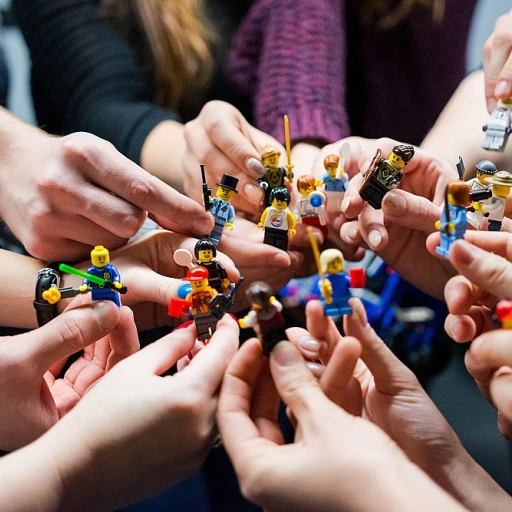
Understanding the Digital Talent Management Landscape
Exploring the Dynamics of Digital Talent Management
In the ever-evolving world of digital talent management, it's crucial to understand the landscape that encompasses roles such as a Digital Talent Management Coordinator. This dynamic position involves navigating a complex environment where creators and influencers are pivotal. As the digital talent scene continues to expand, so do the opportunities and challenges associated with effectively managing influencer marketing and talent development. The primary focus lies in assisting brands and agencies to meet their goals by effectively coordinating the engagement between the myriad of creators and influencers. In recent years, the growth in digital media and social platforms has amplified the importance of talent coordinators who specialize in integrating marketing strategies with influencer partnerships. Incorporating human resources data into talent management is increasingly essential. Data-driven insights enable coordinators to make informed decisions, optimize talent acquisition, and refine marketing strategies to enhance brand objectives. For those seeking to delve deeper into how big data can be leveraged for human resources, unveiling new insights offers a comprehensive perspective. Overall, a Digital Talent Management Coordinator is instrumental in aligning the interests of creators and influencers with corporate clients, managing relationships and ensuring seamless synergy between all parties involved. As we proceed further, we'll explore the specific responsibilities and methodologies implied in this essential role.Key Responsibilities of a Digital Talent Management Coordinator
Core Duties and Industry Expectations
In the thriving domain of digital talent management, coordinators play a multifaceted role. Acting as pivotal connectors between creators, influencers, brands, and talent agencies, these professionals handle the complex maze of relationships and contracts. Their primary duties include:- Facilitating communication and collaboration between creators and brands, ensuring that both parties’ expectations are met.
- Overseeing the execution of contracts and agreements, while safeguarding privacy policies and ensuring user agreements are honored.
- Cultivating networks within the industry, including social media platforms, to find potential clients and creator opportunities.
- Synchronizing influencer marketing strategies with brand goals, thereby enhancing brand architects’ visions.
- Supporting talent acquisition and development, while keeping tabs on industry advancements.
Influence of Media and Digital Channels
Digital talent coordinators also focus on amplifying creators’ and influencers' reach through strategic use of digital media channels. This role encompasses:- Crafting content marketing initiatives to bolster brand identity and visibility across various social media platforms.
- Analyzing key performance indicators to tweak marketing strategies and ensuring that campaigns resonate with target audiences.
- Adapting emerging tools from the digital brand landscape to leverage innovative marketing techniques.
Relationship Building & Management
Engaging with a diverse range of talents requires effective relationship management. These coordinators act as brand managers, honing talent engagement and retention strategies. To excel, coordinators need:- Strong interpersonal and communication skills to manage and navigate diverse personalities and expectations within the media and influencer space.
- Decisive problem-solving skills to address potential conflicts and challenges faced by creators and brands.
- The capability to interpret data insights for talent management, leading to more informed decisions and deeper engagement.
Challenges in Managing Creators and Influencers
Balancing Expectations and Brand Alignment
Managing creators and influencers comes with its own set of unique challenges. One of the primary hurdles for a digital talent management coordinator is balancing the expectations of the creators or influencers with the brand objectives of their agency and clients. Ensuring that the content aligns with the brand's voice without stifling the originality and creativity of influencers can be tricky. A strong understanding of both the digital media landscape and influencer marketing trends is vital. Coordinators must consistently liaise with talent managers and brand architects to ensure every project aligns with the brand ethos and influencer talent's personal brand. This requires astute communication and negotiation skills, particularly in dynamic cities like Los Angeles, where the competition is fierce, and the stakes are high.Navigating Complex Partnerships
Another challenge lies in the intricate nature of partnerships. Influencers, driven by various content styles and preferences, often come with their own established expectations and boundaries. Coordinators need to fill jobs that meet both brand needs and influencer desires seamlessly. Compounding these complexities, there's an ever-present need for adherence to legal frameworks and privacy policies. Understanding these nuances is crucial, especially when coordinating highly visible campaigns. Moreover, talent management often involves adapting to rapid changes in social media algorithms and platform policies which influences content distribution.Maintaining Engagement in a Saturated Market
The digital landscape is saturated, making the role of influencer talent management exceedingly competitive. Coordinators must ensure their creators' content stands out, crafting campaigns that are engaging and unique. Keeping abreast of digital marketing and social media trends is vital to stay ahead. Utilizing human resources data effectively can offer insights into strategies that resonate with audiences. For further insights on the importance of leveraging data in talent management, you might want to read about transforming HR teams for the future. In this evolving industry, digital talent coordinators must continually adapt to changes, ensuring both the influencers' and brands' success through strategic management and coordination.Leveraging Human Resources Data for Talent Management
Utilizing Data for Streamlined Creator and Influencer Coordination
In the evolving landscape of digital talent management, leveraging human resources data has become crucial for optimally managing creators and influencers. As digital talent managers or coordinators, the ability to effectively utilize data not only streamlines operations but also enhances the decision-making process in various facets of talent management.
Human resources data provides valuable insights that inform strategies for coordinating influencer talent. By assessing data patterns, talent coordinators can efficiently align influencers with brands and marketing objectives, ensuring a perfect match that benefits all parties involved.
For example, when a talent manager revises data related to previous influencer campaigns, insights can be gained regarding which influencers drive the most audience engagement and bring the highest return on investment (ROI). This information helps in better selection of creators for future campaigns, thus optimizing the use of resources and maximizing impact.
The advent of digital technologies has enabled agencies and brands to gather extensive amounts of information about audience preferences and behaviors. Utilizing this data helps in crafting personalized influencer marketing strategies that resonate well with target demographics. In addition, coordinating talent using data analytics supports talent acquisition efforts by identifying potential creators who align with the brand’s ethos and style.
However, the effective use of data in talent management also necessitates a strong understanding of data privacy policies and user agreements. Adhering to these guidelines ensures that all data-driven strategies are compliant with industry standards and regulations.
In summary, incorporating human resources data into the talent coordination process significantly enhances the operational efficiency of talent agencies and brands. By analyzing data, coordinators can fill coordinator jobs more effectively by identifying skill gaps and areas for growth within the team, hence fostering a more robust talent management ecosystem.
Tools and Technologies for Effective Talent Coordination
Evolving Digital Marketing Tools for Talent Coordination
The realm of digital media is ever-expanding, and with it, the tools and technologies available for effective talent coordination have become more sophisticated. Talent coordinators in the digital landscape need to leverage these tools to streamline their responsibilities more efficiently.- Social Media Management Platforms: With the rise of influencer marketing, platforms that manage social media content have become invaluable in coordinating and monitoring campaigns for creators and brands alike.
- Influencer Discovery Tools: Identifying suitable influencer talent for specific campaigns is crucial. Utilizing discovery tools aids in matching creators with clients, ensuring that brand messages are aligned with the intended audience.
- Data Analytics Software: Data-driven decision-making enhances talent management processes. By utilizing these tools, coordinators can better understand engagement metrics and adjust strategies, in turn, optimizing the influence of the talent agency.
- Collaboration Platforms: With creators often located in various regions like Los Angeles and beyond, using digital brand collaboration platforms ensures seamless communication and project management across different time zones and teams.
Future Trends in Digital Talent Management
Evolution in Digital Talent Coordination
As the digital landscape continues to evolve, the role of digital talent management coordinators in managing creators and influencers will also undergo significant transformations. A few factors contribute to shaping the future of this industry, and understanding them is crucial for those looking to thrive in coordinator jobs.
Integration of Advanced Analytics
With the rapid advancement in data analytics, agencies and talent managers are now able to leverage insights in real-time. This progression allows for more refined influencer matching, content strategy formulation, and performance tracking. The capability to effectively harness big data analytics could mean an increased need for coordinators who are not only proficient in management but also data-savvy.
Impact of AI and Machine Learning
Artificial Intelligence (AI) and machine learning have begun to play significant roles in talent acquisition and management. These technologies can automate routine tasks, optimize influencer marketing campaigns, and even predict trends. Brand architects and digital brand managers who adapt to these technologies will gain a competitive edge in the influencer marketing industry.
Focus on Personalization and Collaboration
Moving forward, personalization of content and strategies will likely become even more essential. Talented coordinators will need to work closely with creators and brands to craft customized approaches that resonate with specific audiences. This collaborative effort ensures that talent agency objectives are aligned with creator influencers’ goals, ultimately benefiting both ends.
Heightened Emphasis on Privacy and Compliance
Given the growing concerns over data privacy, compliance with privacy policy standards and user agreements will be of paramount importance. Talent managers will need to prioritize content that respects consumer privacy while still delivering measurable marketing results.
Embracing Continuous Learning
As technologies and digital media environments change, the requirement for ongoing education will rise. Coordinators and managers must remain agile, constantly updating their skills and knowledge to fill the ever-evolving demand for innovative digital strategies.













